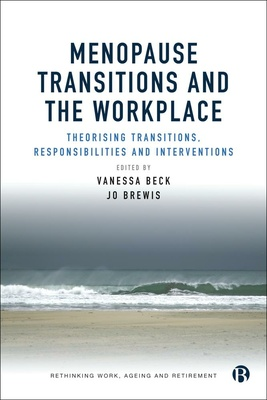You are here
- Home
- Publication
- Effects of menopause in the workplace tackled in OU professor’s new book
Effects of menopause in the workplace tackled in OU professor’s new book

Jo Brewis, Professor of People and Organisations at The Open University Business School, has released a new book giving insight on the latest knowledge in the field of menopause in the workplace.
The book ‘Menopause Transitions and the Workplace’ offers practical approaches that can be implemented in workplaces to support women and others transitioning through menopause, as well as considering theoretical frameworks and research data.
Despite the fact that the symptoms of menopause transitions can have profound implications for work and are, in turn, affected by work, this is still a topic that is rarely discussed in management and organisation studies.
The book, which has been co-edited with Jo’s long-time collaborator Prof Vanessa Beck (University of Bristol), tackles various aspects of menopause in the workplace, what support organisations and individuals can offer, and the key areas that researchers need to investigate next. Another key message of the book is that it isn’t just cis women (those who were assigned the female sex at birth and continue to identify as women) who experience menopause: some transgender men and non-binary people will also go through it if they have ovaries.
Employers must support those experiencing menopausal symptoms
Jo has long called for employers to pay careful attention to the menopause as it affects one of the fastest growing groups in the workplace in the UK (mid-life cis women) and indeed elsewhere in the global north. But there are other reasons beyond demographics for employers to take action.
There is legislative protection in many countries against discrimination on the grounds of sex, age and disability, for example, and seven UK employment tribunals have already succeeded taken wholly or in part on the basis of menopause.
Employers can be financially impacted through diminished productivity or losing vital skills and knowledge. In fact, research by Evandrou et al. (2021) and Bryson et al (2022) suggests that women with severe symptoms and those who experience menopause before the age of 45 are much more likely to either reduce their working hours or leave their jobs altogether.
There is also the case for the social responsibility, where Jo argues that supporting staff with difficult menopausal symptoms is the right thing to do, just as it is to support pregnant staff and new parents in the workplace.
In addition, Jo said:
Opening up conversations about experiences of menopause in the workplace not only helps to dispel the stigma around it, but it also encourages employers to offer support that can actually benefit the wider workforce.
"Flexible working options, breathable uniforms, better sanitary provision, decaffeinated drinks, rest areas, showers, lighting, and more considered use of shared spaces (particularly where temperature is an issue) - all of these options can also benefit staff more widely and employers are able to offer these support packages without staff having to disclose menopausal symptoms.
"These conversations also help to shine a light on reproductive health more widely, normalising things like endometriosis and PCOS (polycystic ovary syndrome).”
Offering new insights following government report

The new book follows on from a 2017 government report co-authored by Jo, The effects of menopause transition on women's economic participation in the UK, which was developed for the Government Equalities Office to review evidence on the connections between the experiences of working women and menopausal symptoms.
The book recaps what was not known at the time of this report and details what has been learned since then. Some of the new findings include further empirical research in UK workplaces, the effectiveness of unions around menopause as a workplace issue and the importance of male allyship.
The book also addresses flexible working and whether this can be a help or a hindrance, as well as the impact of the psychological contract (the unspoken expectations of employer and employee).
Jo and Vanessa spoke about the book on the Transforming Society podcast, where they explained the use of the word ‘transitions’ in the book title, which relates to the multiple stages of menopause in which symptoms can be experienced, as well as the fact that menopause is unique to everyone who experiences it. The term itself refers specifically to the instance 12 months after a woman’s last period, however symptoms such as fatigue, hot flushes, and an inability to concentrate can be present throughout peri- and post-menopausal stages too. They highlighted that these symptoms can not only be uncomfortable in a working situation, but also exacerbated by working conditions.
Progress in the UK but still much to be done
The UK are world leaders in making advances in the workplace and half of employers in the UK now have something in place to support menopausal workers. The police force, in particular, has been a pioneer in implementing initiatives to support menopausal workers, including the widespread introduction of uniforms designed to minimise hot flushes.
However, there are still many sectors where the nature of the job can make certain interventions challenging. For example, surgeons who need to wear scrubs, masks and gloves and operate under surgical lighting, nurses and midwives who cannot always leave their patients to take time out to cope with symptoms, and women in construction or firefighters who are required to wear PPE (personal protective equipment).
Jo said:
Being part of this movement in bringing menopause issues in the workplace to the fore is the single most impactful project I have ever been involved in, but I know there is much more to do.
"There are still gaps in our knowledge about menopause and the workplace, including the experiences of those who identify as lesbian, bisexual, transgender, non-binary or gender non-conforming; women who attain menopause early; women who experience ‘cliff-edge’ menopause, for example because of an oophorectomy where they have their ovaries removed; BAME (Black, Asian and minority ethnic) women; women in ‘lower skilled’ or manual occupations; and women with disabilities.
"It is important to continue these conversations and maintain the momentum, so I hope that other people will be inspired to start their own research projects in the many different areas where there is still much to learn. I also hope the book spurs still more workplace initiatives, in the UK and elsewhere.”
Upcoming Events
Student Hub Live: SHL End-of-year party!
Tuesday, June 24, 2025 - 19:00 to 20:00
Online with Student Hub Live
